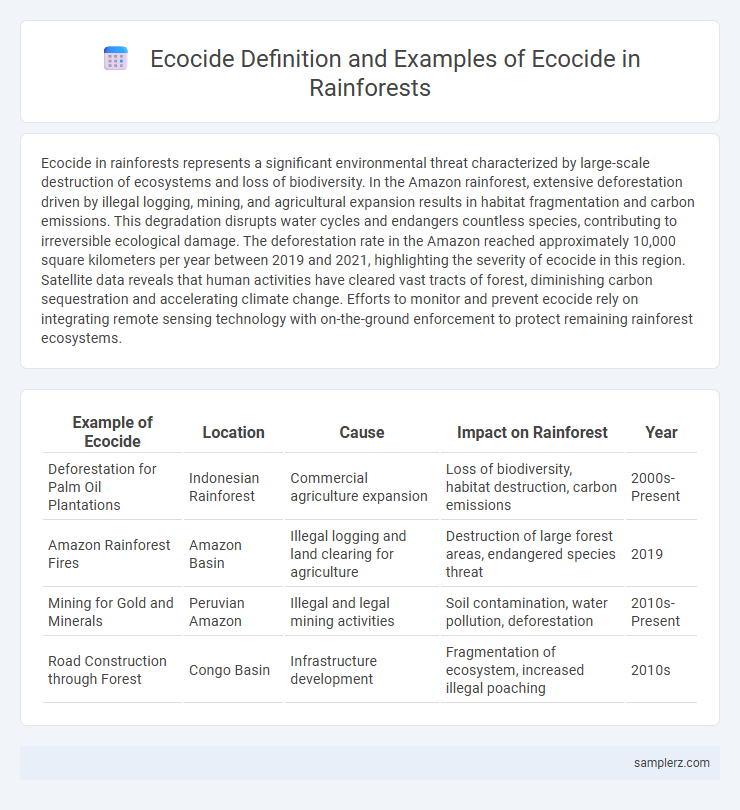Ecocide in rainforests represents a significant environmental threat characterized by large-scale destruction of ecosystems and loss of biodiversity. In the Amazon rainforest, extensive deforestation driven by illegal logging, mining, and agricultural expansion results in habitat fragmentation and carbon emissions. This degradation disrupts water cycles and endangers countless species, contributing to irreversible ecological damage. The deforestation rate in the Amazon reached approximately 10,000 square kilometers per year between 2019 and 2021, highlighting the severity of ecocide in this region. Satellite data reveals that human activities have cleared vast tracts of forest, diminishing carbon sequestration and accelerating climate change. Efforts to monitor and prevent ecocide rely on integrating remote sensing technology with on-the-ground enforcement to protect remaining rainforest ecosystems.
Table of Comparison
| Example of Ecocide | Location | Cause | Impact on Rainforest | Year |
|---|---|---|---|---|
| Deforestation for Palm Oil Plantations | Indonesian Rainforest | Commercial agriculture expansion | Loss of biodiversity, habitat destruction, carbon emissions | 2000s-Present |
| Amazon Rainforest Fires | Amazon Basin | Illegal logging and land clearing for agriculture | Destruction of large forest areas, endangered species threat | 2019 |
| Mining for Gold and Minerals | Peruvian Amazon | Illegal and legal mining activities | Soil contamination, water pollution, deforestation | 2010s-Present |
| Road Construction through Forest | Congo Basin | Infrastructure development | Fragmentation of ecosystem, increased illegal poaching | 2010s |
Introduction to Ecocide in Rainforests
Ecocide in rainforests refers to the large-scale destruction of vital forest ecosystems, often caused by illegal logging, mining, and agricultural expansion. The Amazon Rainforest, home to over 10% of known species and crucial for global carbon regulation, faces significant threats from these activities. This widespread environmental damage disrupts biodiversity, contributes to climate change, and undermines the livelihoods of indigenous communities dependent on the forest.
Defining Ecocide: Legal and Environmental Perspectives
Ecocide refers to the extensive destruction of ecosystems, particularly in rainforests, where illegal logging and deforestation lead to the loss of biodiversity and disrupt climate regulation. Legal frameworks defining ecocide aim to hold corporations and governments accountable for actions causing severe environmental damage, emphasizing restoration and prevention. Recognizing ecocide as a crime enhances global efforts to protect rainforests and ensures stricter enforcement of environmental regulations.
Amazon Rainforest: Chronic Deforestation and Its Consequences
The Amazon Rainforest faces chronic deforestation due to illegal logging, agriculture expansion, and mining activities, resulting in the loss of approximately 1.5 million hectares annually. This ecocide disrupts biodiversity, threatens indigenous communities, and accelerates carbon emissions, contributing significantly to global climate change. Efforts to enforce stricter environmental regulations and promote sustainable land management remain critical to mitigating the long-term damage in this vital ecosystem.
Palm Oil Plantations and Forest Destruction in Southeast Asia
Palm oil plantations in Southeast Asia have caused widespread deforestation, leading to significant biodiversity loss and soil degradation. Vast areas of tropical rainforest, especially in Indonesia and Malaysia, are cleared annually to accommodate monoculture palm oil crops. This large-scale forest destruction contributes to carbon emissions, threatening climate stability and indigenous communities' livelihoods.
Illegal Logging and Habitat Loss Across Rainforests
Illegal logging in the Amazon and Congo rainforests accelerates habitat loss, threatening countless species and disrupting carbon sequestration critical for global climate regulation. Vast swathes of rainforest are cleared each year, driven by unregulated timber extraction and land conversion for agriculture, which undermines biodiversity and indigenous livelihoods. Persistent deforestation from these activities exemplifies ecocide by destroying irreplaceable ecosystems essential for environmental stability.
Mining Operations and Toxic Pollution in Tropical Forests
Mining operations in tropical rainforests cause severe ecocide by destroying vast areas of biodiversity-rich habitats and contaminating soil and water with heavy metals such as mercury and arsenic. Toxic pollution from these activities devastates aquatic ecosystems and threatens indigenous communities reliant on clean water sources. The long-lasting environmental damage includes deforestation, loss of wildlife, and bioaccumulation of pollutants that disrupt entire forest ecosystems.
Indigenous Communities Affected by Rainforest Ecocide
The destruction of the Amazon rainforest through illegal logging and mining has devastated Indigenous communities, eroding their traditional lands and livelihoods crucial for cultural survival. Ecocide disrupts the biodiversity that sustains subsistence practices like hunting and gathering, threatening food security and health for Indigenous peoples. Loss of sacred sites and displacement due to deforestation further undermine Indigenous autonomy and their role as stewards of the rainforest ecosystem.
Biodiversity Collapse: Endangered Species in Rainforest Ecosystems
Deforestation and illegal logging in rainforests drive ecocide, causing severe biodiversity collapse and pushing numerous species toward extinction. Iconic animals like the jaguar, orangutan, and various amphibians face habitat loss, disrupting ecological balance and genetic diversity. Conservation efforts must target these endangered species to preserve rainforest ecosystems and ensure long-term environmental stability.
Climate Change Impacts of Large-Scale Forest Loss
Massive deforestation in the Amazon rainforest results in significant carbon emissions, accelerating global climate change by reducing the forest's capacity to sequester carbon dioxide. The destruction of millions of hectares leads to disrupted rainfall patterns and increased atmospheric temperatures, impacting biodiversity and local communities. Such large-scale forest loss contributes to a feedback loop that intensifies climate change and threatens global ecological stability.
Global Efforts to Prevent and Prosecute Rainforest Ecocide
Global initiatives such as the proposed international Ecocide Law aim to classify large-scale rainforest destruction as a prosecutable offense, enhancing legal frameworks to hold corporations and governments accountable. Organizations like the United Nations Environment Programme (UNEP) and the International Criminal Court (ICC) collaborate to monitor deforestation rates, enforce environmental regulations, and facilitate cross-border legal actions against ecocide perpetrators. These efforts focus on preserving biodiversity, preventing irreversible ecosystem damage, and promoting sustainable management within critical rainforest regions such as the Amazon and Congo Basin.

example of ecocide in rainforest Infographic
 samplerz.com
samplerz.com